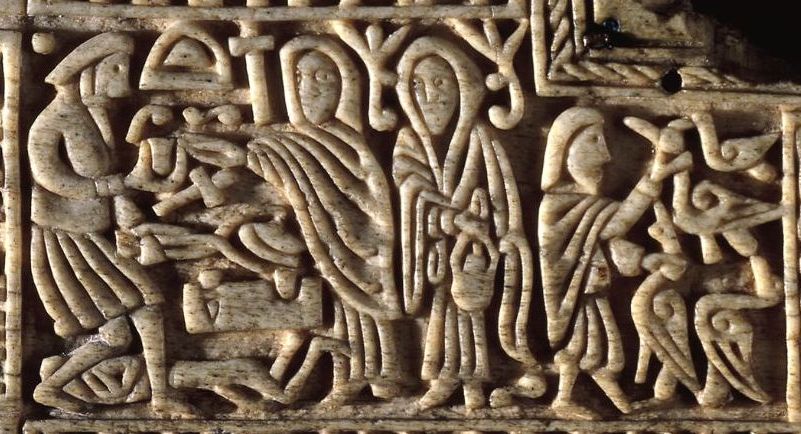
As part of Notre Dame’s ongoing Medieval poetry translation and recitation project, I offer a creatively translated Deor, a poem from the Exeter Book (Exeter Cathedral Library MS 3501), which I have titled “Deor’s Dark Elegies” and which describes a series of unfortunate events befalling legendary figures of heroic legend for the perspective of a struggling narrator. As a translation, “Deor’s Dark Elegies” is an adapted and interpretive rendition of the Exeter Book poem, and should not be taken as a literal translation of the Old English despite that it follows closely to the original in many places.
Old English Deor:
Welund him be wurman wræces cunnade.
Anhydig eorl earfoþa dreag,
hæfde him to gesiþþe sorge ond longaþ,
wintercealde wræce, wean oft onfond,
siþþan hine Niðhad on nede legde
swoncre seonobende on syllan monn.
Þæs ofereode, þisses swa mæg!
Beadohilde ne wæs hyre broþra deaþ
on sefan swa sar swa hyre sylfre þing:
þæt heo gearolice ongieten hæfde
þæt heo eacen wæs— æfre ne meahte
þriste geþencan, hu ymb þæt sceolde.
Þæs ofereode, þisses swa mæg!
We þæt Mæðhilde monge gefrugnon
wurdon grundlease Geates frige,
þæt hi seo sorglufu slæp ealle binom.
Þæs ofereode, þisses swa mæg!
Ðeodric ahte þritig wintra
Mæringa burg— þæt wæs monegum cuþ.
Þæs ofereode, þisses swa mæg!
We geascodan Eormanrices
wylfenne geþoht; ahte wide folc
Gotena rices. Þæt wæs grim cyning.
Sæt secg monig sorgum gebunden,
wean on wenan, wyscte geneahhe
þæt þæs cynerice ofercumen wære.
Þæs ofereode, þisses swa mæg!
Siteð sorgcearig sælum bidæled,
on sefan sweorceð, sylfum þinceð
þæt sy endeleas earfoða dæl.
Mæg þonne geþencan þæt geond þas woruld
witig dryhten wendeþ geneahhe,
eorle monegum are gesceawað,
wislicne blæd, sumum weana dæl.
Þæt ic bi me sylfum secgan wille,
þæt ic hwile wæs Heodeninga scop,
dryhtne dyre. Me wæs Deor noma.
Ahte ic fela wintra folgað tilne,
holdne hlaford, oþþæt Heorrenda nu,
leoðcræftig monn londryht geþah,
þæt me eorla hleo ær gesealde.
Þæs ofereode, þisses swa mæg!
Old English Deor from edition by Bernard Muir, The Exeter Anthology of Old English Poetry, Volume I, Exeter: University of Exeter Press, 2000; a reproduced edition is also available online.
“Deor’s Dark Elegies:” A Modern English Translation by Richard Fahey:
Translator’s Preface
Weland
He knew himself some misery
among the worms.
The single-minded man endured torture.
He had for himself as companions,
sorrow and longing.
The winter-cold wretch found woe often,
once Nithhad bound him in service
with a trim sinew-bond on the better man.
That passed away, may this too.
Beadohild
Her brother’s death, for her,
was not as troubling to her mind
as her own issue,
when she began to realize
that she was pregnant.
She was never able to think clearly
about how that should be.
That passed away, may this too.
Mæðhild
For her, we have heard that
there were many endless embraces with the Geats,
that sorrow-love stole all her sleep.
That passed away, may this too.
Ðeodric
He possessed the stronghold of the Merovingians
for thirty winters,
which was known to many.
That passed away, may this too.
Eormanric
We have learned of his wolfish thought,
he, who widely ruled the people
Of the Gothic realm.
That was a grim king.
Many a man sat
bewound with sorrows,
woe upon woe,
and wished often
that the kingdom were overcome.
That passed away, may this too.
I sit, sorrow-weary, bereft of joys.
My mood darkens.
It seems to me that my share of troubles
is endless.
Then I am prompted to contemplate how
the wise ruler frequently turns.
Honor is shown to many a man,
true glory,
but to some a share of woe.
This I will say about myself,
that I, for a while,
to my dear lord,
was the poet of the Heodenings.
Deor was my name.
I held, for many winters,
good service to my loyal lord,
until now, when Heorrenda,
that song-crafty man,
received the land-rights
that the protector of the realm
before gave to me.
That passed away, may this too.
Recitations by Richard Fahey
In Old English (edited by Tom Fahey):
In Modern English translation:
Richard Fahey
PhD Candidate
University of Notre Dame
